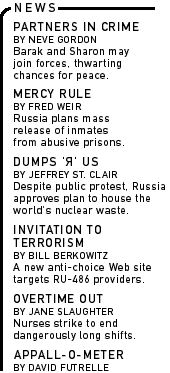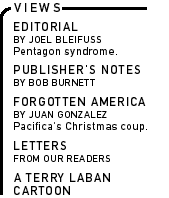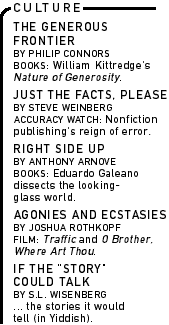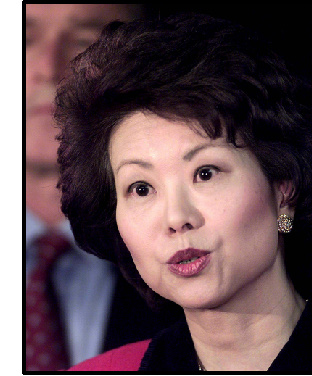

|

|

|

|
| |
|
|
|
The early reviews are in on the new George W. Bush administration. It has all the elements of the classic horror story: a predictable plot, familiar villains and an unshakable sense of déjà vu. On the following pages, we take a look at Bush's nominees and appointments, a diverse cast of characters in every way but ideology. Left to their own devices, this collection of unrepentant cold warriors, anti-choice extremists, Wise-Use desperados and corporate shills (as well as a couple of reasonable old-fashioned conservatives) could make for a harrowing next four years. Can the forces of good thwart this evil plan? Well, as In These Times went to press, thousands of townspeople were taking their torches to Washington to protest Dubya's inauguration, making one thing clear: There will be no honeymoon! Craig Aaron
Labor unions had reason to celebrate when Linda Chavez, George W. Bush's first choice for labor secretary, withdrew from consideration. As a federal official, candidate, columnist and sharp-tongued heroine of the political right, she had been hostile to affirmative action and to a wide range of workers rights. But her downfall came not because of her views or union opposition to her nomination, but because she tried to conceal information from the Bush transition team about her payments to an illegal immigrant who was living and working in her house. As her replacement, Bush picked Elaine Chao, a candidate who has less of a record on issues related to the labor post and a career as a more diplomatic administrator than Chavez--but no apparent difference on major issues. Bush's choice sent an unmistakable signal to trade unions that they will be in for a
Chavez, who once was an aide to former American Federation of Teachers President Al Shanker, made a career attacking affirmative action and bilingual education, but she also opposed a higher minimum wage, mocked sexual harassment complaints, rejected family and medical leave and criticized doctors for forming unions. Her own record as a director of the federal Civil Rights Commission, which she nearly dismantled, and as a tough partisan attack-dog suggested that she would undermine the effectiveness of the Labor Department and turn it against organized labor. Chao shares Chavez's opposition to affirmative action, but her more business-like conservative style led the AFL-CIO to adopt an essentially neutral stance; the Communications Workers and Machinists unions endorsed her appointment. Chao held a variety of positions under Reagan and in the first Bush administration, including chairwoman of the Federal Maritime Commission, deputy secretary of transportation and director of the Peace Corps, before becoming president of the United Way in 1992. The wife of Kentucky Republican Sen. Mitch McConnell, a leading opponent of campaign finance reform, Chao has been a fellow at the conservative Heritage Institute since 1996. Given the narrow Republican control of Congress, there are good reasons to expect Bush and Chao to promote an agenda that will give business owners more flexibility and less regulation. For example, Republicans have been trying to make it easier for businesses to classify workers as "independent contractors," to set up workplace "teams" that would effectively revive long-outlawed company-controlled unions, or to offer compensatory time off instead of paying premium rates for overtime work. Republicans also have tried to free businesses from direct Occupational Safety and Health Administration oversight, and may attempt to overturn the ergonomics standards for safe workplace design put in place late last year after 10 years of review and politically motivated delays. One of the few things unions got out of the Clinton presidency
was a reliable veto of most Republican anti-union initiatives. Now
a Senate filibuster is the last line of defense. But by building
on their mobilization of union members for political action, labor
unions are also confident that they can win many of the fights ahead.
With his appointments, Bush has made it clear that he intends to
pick those fights.
|


